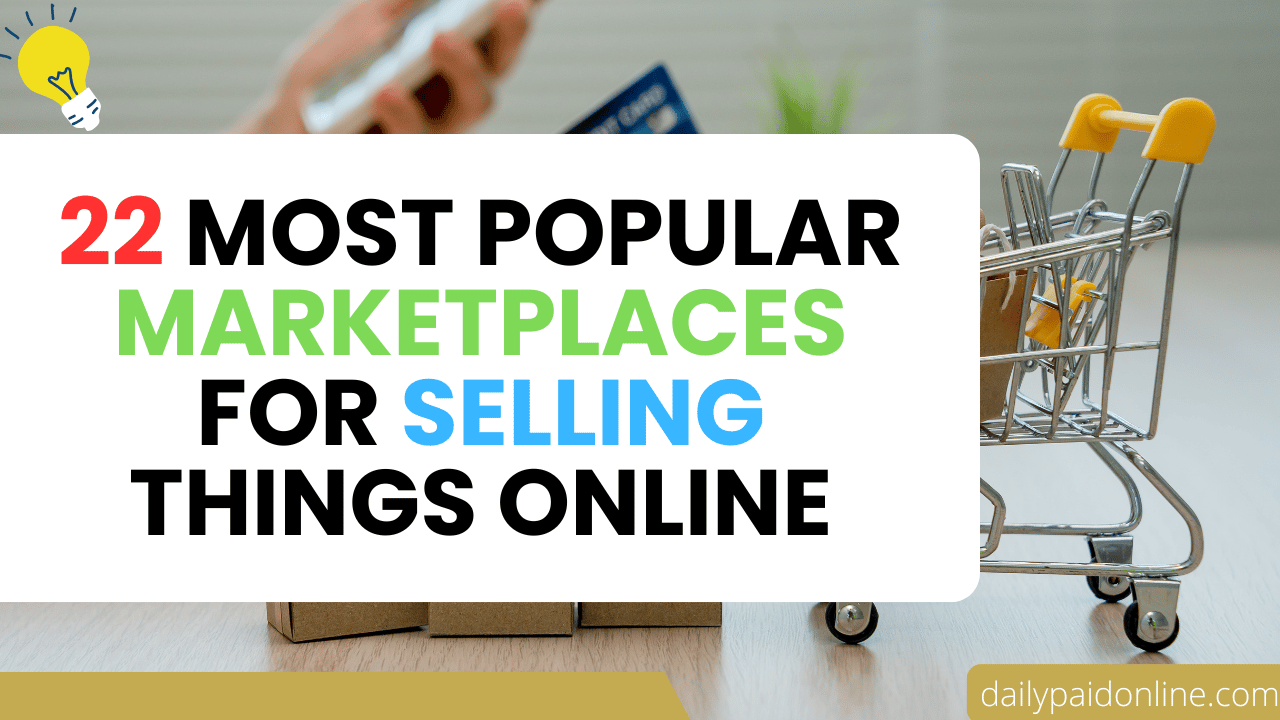The information provided in this blog post is for general informational and educational purposes only. It may contain affiliate links. If you make a purchase using one of these links, we may receive compensation at no extra cost to you. This will help us to maintain the website. Please read our disclosure policy for more information.
As someone with expertise in SEO and digital marketing, I understand the importance of choosing the right online marketplace for your business. Whether you’re just starting your e-commerce journey or looking to expand your existing online presence, selecting the appropriate platform can make all the difference in your success.
Why Online Marketplaces Matter in 2025
The e-commerce landscape has evolved dramatically, with online marketplaces accounting for over 60% of global online sales. For entrepreneurs and businesses like yours, these platforms offer ready-made audiences, built-in trust, and streamlined selling processes. As someone who teaches digital marketing and runs searchmaga.com, you know that visibility is key, and these marketplaces provide instant access to millions of potential customers.
General Marketplaces: The Giants of E-commerce
1. Amazon
The undisputed king of online marketplaces, Amazon serves over 300 million active users worldwide. With Fulfillment by Amazon (FBA), sellers can leverage Amazon’s logistics network. The platform is ideal for virtually any product category, from books to electronics to handmade crafts.
2. eBay
One of the pioneers in online selling, eBay offers both auction-style and fixed-price listings. It’s particularly strong for collectibles, vintage items, and used goods. The platform’s global reach makes it excellent for international selling.
3. Walmart Marketplace
Walmart’s online marketplace has grown exponentially, offering sellers access to millions of customers. With strict quality standards, it’s become a trusted alternative to Amazon for many shoppers.
4. Facebook Marketplace
Leveraging Facebook’s massive user base, this platform excels for local sales and unique items. As someone skilled in storytelling, you’d appreciate how Facebook’s social features allow sellers to build personal connections with buyers.
5. Mercari
A user-friendly platform that’s gained popularity for its simplicity. Mercari handles shipping labels and offers seller protection, making it ideal for beginners.
Specialized and Niche Marketplaces
6. Etsy
The go-to platform for handmade, vintage, and craft items. With your graphic design background, you might find Etsy particularly appealing for selling digital designs or custom creations.
7. Poshmark
Specializing in fashion and accessories, Poshmark combines social media elements with e-commerce. The platform’s “Posh Parties” create engaging selling experiences.
8. Depop
Popular among Gen Z, Depop focuses on trendy, vintage, and streetwear fashion. Its Instagram-like interface appeals to younger demographics.
9. StockX
The premier marketplace for authenticated sneakers, streetwear, and collectibles. StockX operates like a stock market for physical goods.
10. Reverb
Musicians and music enthusiasts flock to Reverb for instruments and audio equipment. The platform offers specialized tools for music gear pricing and shipping.
International and Regional Marketplaces
11. Alibaba
The B2B giant connecting manufacturers with retailers worldwide. Perfect for bulk purchases and wholesale operations.
12. Rakuten
Japan’s largest e-commerce platform with a growing international presence. Rakuten offers cashback programs that attract loyal customers.
13. MercadoLibre
The Amazon of Latin America, serving millions across Spanish and Portuguese-speaking countries. Given your Spanish language skills, this could be an excellent expansion opportunity.
14. Shopee
Dominating Southeast Asian markets, Shopee offers integrated payment and shipping solutions tailored to regional preferences.
Creative and Digital Marketplaces
15. Creative Market
As a graphic designer, you’ll appreciate Creative Market’s focus on digital design assets, templates, and creative resources.
16. Envato Market
A collection of themed marketplaces, including ThemeForest and GraphicRiver, perfect for selling WordPress themes, graphics, and video templates – aligning perfectly with your video editing and WordPress expertise.
17. Gumroad
Ideal for digital products, courses, and memberships. Your Shopify and digital marketing courses would fit perfectly here.
18. Udemy
While primarily an educational platform, Udemy’s marketplace model allows instructors to sell courses to millions of students worldwide.
Service-Based Marketplaces
19. Fiverr
A freelance marketplace where your SEO, graphic design, and video editing skills could command premium prices. The platform’s gig-based system suits project-based work.
20. Upwork
For longer-term projects and professional services, Upwork connects skilled professionals with businesses seeking expertise.
21. 99designs
Specifically for design work, this platform uses contest and project-based models that could showcase your graphic design portfolio.
22. Teachable
Perfect for course creators, Teachable provides tools to build, market, and sell online courses – ideal for your Shopify and digital marketing teaching endeavors.
Choosing the Right Marketplace: Key Considerations
Target Audience Alignment
Different marketplaces attract different customers. Think about where your ideal customers shop. For example, if you want to reach young entrepreneurs for your digital marketing course, platforms like Gumroad or Teachable may work better than traditional marketplaces.
Fee Structures
Knowing about marketplace fees is key to making a profit. Amazon charges referral fees between 6% and 45% based on the product category. Etsy has a 6.5% transaction fee and also charges listing fees. Make sure to factor these costs into your pricing strategy.
SEO and Discoverability
As an SEO expert, you know how important it is to optimize your listings. Each marketplace has its own rules for search results. Amazon focuses on sales speed and customer satisfaction, while Etsy cares about relevant tags and updated listings. Make sure to optimize your listings based on the needs of each platform.
Integration Capabilities
If you have experience with SaaS and want to develop apps, look for marketplaces that provide strong APIs and integration options. This will help you automate tasks and scale your business as it grows.
Maximizing Success Across Multiple Marketplaces
Cross-Platform Strategy
Don’t stick to just one marketplace. Using multiple platforms helps you lower risk and gain more visibility. Tools like Shopify can help you manage your inventory across different platforms easily.
Brand Consistency
Keep your branding the same across all marketplaces. Your graphic design skills will help create a unified look that builds trust and recognition.
Data-Driven Optimization
Since you are interested in data science and Python, you can analyze how well different marketplaces perform. Track important metrics like conversion rates, average order values, and customer acquisition costs to improve your strategy.
Content Marketing Integration
Use your storytelling skills to write engaging product descriptions and brand stories. Quality content can increase conversions and improve your search rankings in marketplaces.
Future-Proofing Your Marketplace Strategy
The e-commerce world is changing with new technologies like AI, social media shopping, and immersive experiences. When creating your app, think about how these technologies can work with online selling. Features like voice shopping, AR try-ons, and personalized AI are becoming common.
Your skills in dental surgery, design, and technology give you a strong advantage in the e-commerce market. Your attention to detail from your medical background, along with your creative and technical skills, provides a solid base for success in online selling.
Conclusion
Choosing the right online marketplace is important for your e-commerce success. Whether you sell physical products, digital goods, or services, there are platforms that fit your needs. Start with marketplaces that match your skills and what you offer. For example, use Envato for WordPress themes, Teachable for courses, or Fiverr for design services. As you grow, consider expanding to other platforms while keeping your audience and business goals in mind.
Success in online marketplaces is not just about picking the right platform. It also involves optimizing your presence, understanding your customers, and adjusting to market changes. With your skills and entrepreneurial spirit, you can succeed in the fast-paced world of online selling.

